
Become a member
Join today and help protect nature, beauty and history – for everyone, for ever. Enjoy access to more than 500 places with National Trust membership.
Historic, poetic, iconic: a refuge dedicated to beauty. Vita Sackville-West and Harold Nicolson fell in love with Sissinghurst Castle and created a world-renowned garden.
Biddenden Road, near Cranbrook, Kent, TN17 2AB
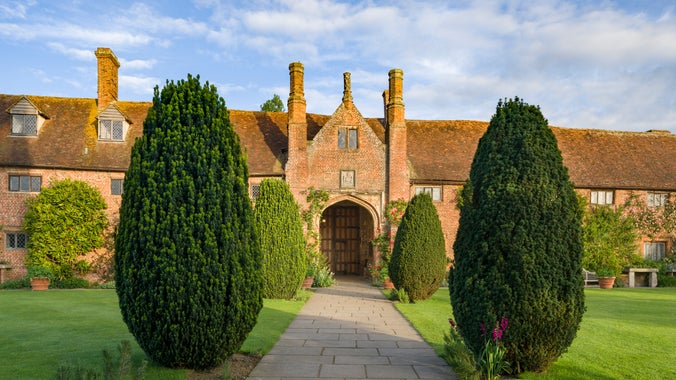
| M | T | W | T | F | S | S |
|---|---|---|---|---|---|---|
Open
Closed
| Asset | Opening time |
|---|---|
| Garden | 11:00 - 16:00 |
| Estate | 10:00 - 16:00 |
| Restaurant | 10:00 - 16:00 |
| Shop | 10:00 - 16:00 |
| Tower | 11:00 - 15:30 |
| The Big Room (Library) | 11:00 - 15:30 |
| Coffee Shop | 10:00 - 15:00 |
| Exhibition | 11:00 - 15:30 |
Last entry to the property is at 3:15pm. The exhibition space, tower and Big Room (library) close at 3:30pm. The South Cottage times may vary, please see our events page for more information. Our opening times will extend from 23 March 2026.
| Ticket type | With Gift Aid | Without Gift Aid |
|---|---|---|
| Adult (18+) | £14.30 | £13.00 |
| Child (5-17) under 5s free | £7.20 | £6.50 |
| Family (2 Adults and up to 3 children) | £35.80 | £32.50 |
| One adult family | £21.50 | £19.50 |
| Ticket type | With Gift Aid | Without Gift Aid |
|---|---|---|
| £4.00 |
Car parking is free for National Trust members. If you are not a member, car parking is £4 and can be paid at Visitor Reception.
Our coffee shop has reopened and is located near the car park, next to our plant shop. Please visit our Opening Times for the daily opening hours.
Dogs on leads are welcome around the wider estate but are not allowed in the formal garden or the vegetable garden. If you wish to enter the garden with an assistance dog or another guide animal, please speak to Visitor Reception.
8 22kw electric vehicle charging points are available in bay 1 of main car park. Chargers can be accessed using mobile app, RFID card, or contactless payment device. Visit our EV charging provider RAW Charging’s website (rawcharging.com) to download the app in advance of your visit. Chargers are only available during property opening hours.
Electric vehicle charging point - more informationPlease visit our Events section for more information on garden and property tours.
Dogs are not allowed inside the restaurant but are allowed in the outdoor seating area.
Toilets and disabled toilets are available next to Visitor Reception and the Restaurant.
Designated disabled parking in the main car park. Adapted toilet on level ground at visitor reception and via ramp at restaurant. Due to narrow pathways, pushchairs are not allowed in the main garden but carriers are welcome. There is a step free route around the property and garden, but please note that this may be difficult to navigate due to uneven terrain. Unfenced lakes, moat and ponds around the estate.
Accessibility routes are available on our main map of the site or upon request at Visitor Reception or the Garden Gate.
Accessible toilets and baby changing facilities are available next to Visitor Reception and at the Restaurant.
We offer several accessible parking bays in our car park, and offer bicycle parking down by Visitor Reception. Upon arrival, our stewards will direct you where to go.
Drop-off and pick up at Visitor Reception, if required.
Wheelchairs are available but must be booked before arrival.
There are lots of things to consider whilst planning your visit to Sissinghurst Castle Garden. Whether it's your first visit or your 100th, find out all the need to know information here.

View and download our site map here. Explore recommended routes around the wider estate which take you through working farmland, shaded lakes and tranquil woodland. A map of the garden is available on our garden article.
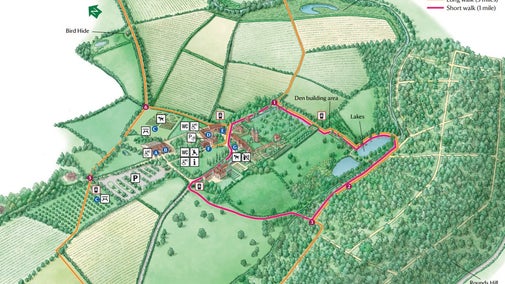
For the first time, diplomat Harold Nicolson's role in the fortunes of post-war Greece takes centre stage in this landmark exhibition. Discover his first-hand accounts of the 1919 Paris Peace Conference, his relationship with Greek Prime Minister Eleftherios Venizelos, and how his travels inspired his iconic home and garden here at Sissinghurst.

Sissinghurst Castle Garden is a one pawprint rated place. Dogs are welcome so you can feel at ease when strolling through the estate. Here's some useful information to help you enjoy your walk.

All aerial activity above our sites is prohibited unless specific permission is granted, according to an existing byelaw.

Visiting as a group to Sissinghurst Castle Garden couldn’t be easier; here’s how to arrange a group visit.

A symbol of love and horticultural ambition, created by Vita Sackville-West and Harold Nicolson in the early 1930s. Designed in a series of 'rooms' with summer highlights including the Rose Garden and the White Garden.
A No Dig garden bursting with fresh vegetables, herbs and fruit, having achieved Organic accreditation in 2023 from the Soil Association.
Home to Vita's Writing Room. Vast panoramic views of the formal garden, working farm and 450-acre wider estate from the very top.
Nicknamed 'The Big Room', this atmospheric space was originally used for entertaining by Vita and Harold and is now home to exhibitions throughout the year.
Take home a living piece of Sissinghurst with plants and seasonal vegetables that are grown right here on site.
Seasonal gifts ranging from stylish homeware, locally produced products, books and more.
A wide range of donated books ready to start their new chapter in life.
Serves hot and cold drinks, tasty light bites and cakes. Indoor and outdoor seating available. See opening times for more information.
Hop on down and treat the whole family to an eggcellent day out at Sissinghurst on our Easter trail. Take part in challenges and win a delicious prize at the end. £3.50 per trail. Find out more here.

Explore the garden at Sissinghurst this season and discover why it ranks among the most famous gardens in England.

For the first time, diplomat Harold Nicolson's role in the fortunes of post-war Greece takes centre stage in this landmark exhibition. Discover his first-hand accounts of the 1919 Paris Peace Conference, his relationship with Greek Prime Minister Eleftherios Venizelos, and how his travels inspired his iconic home and garden here at Sissinghurst.

Climb the Tower at Sissinghurst for views of the whole garden and peruse thousands of books in the Library.

Enjoy a fun-filled family day out at Sissinghurst Castle Garden this season. With an Easter Egg Hunt, seasonal trails, gardens, lakes and over 400 acres to explore, there's something for everyone.

Find out more about the veg, fruit and herbs we grow in the vegetable garden at Sissinghurst and what happens to the produce after it’s picked.
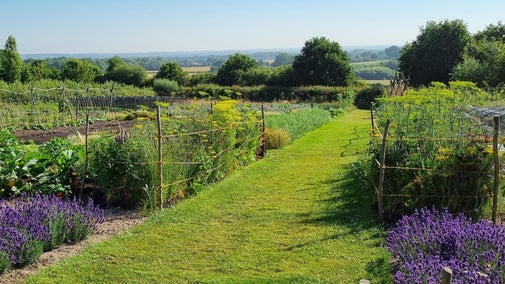
With 460 acres of beautiful Wealden countryside there’s plenty of space to explore, run around, walk the dog, cycle and spot wildlife on the estate at Sissinghurst Castle Garden.
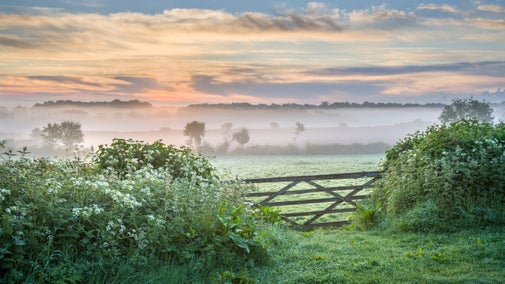
Try tasty dishes in the Granary restaurant or a quick pitstop in the Old Dairy coffee shop at Sissinghurst Castle Garden, using ingredients fresh from the vegetable garden. Serving between 12pm-3pm.

Find a souvenir of your visit with plants grown in the nursery, gifts and souvenirs telling the stories of Sissinghurst in the gift shop and a vast collection of second-hand books.

Explore highlights of the 450-acre estate around Sissinghurst Castle Garden on this circular walk, taking in a 16th-century tower and Sissinghurst Castle Farm.


Sitting on the edge of Sissinghurst Castle’s gardens, this is the perfect spot for garden lovers.

Immerse yourself in rolling farmland and peaceful countryside. This cosy cottage is the perfect getaway for friends and family.
Located on the grounds of Sissinghurst Castle Garden, this stunning Victorian Farmhouse offers a luxurious bed and breakfast service in the very heart of the Weald of Kent.

For the first time, diplomat Harold Nicolson's role in the fortunes of post-war Greece takes centre stage in this exhibition at Sissinghurst. Now extended until 28 June 2026.
Hop on down and treat the whole family to an eggcellent day out at Sissinghurst on our Easter trail.
Changeling Theatre brings Shakespeare's best rom-com to the outdoor stage at Sissinghurst.
The Three Inch Fools return to Sissinghurst with an epic tale of Arthurian adventure and medieval mayhem.
Vita Sackville-West, the poet and writer, began transforming Sissinghurst Castle in the 1930s with her diplomat and author husband, Harold Nicolson. Harold's architectural planning of the garden rooms, and the colourful, abundant planting in the gardens by Vita, reflect the romance and intimacy of her poems and writings.
Sissinghurst Castle Garden was the backdrop for a diverse history; from the astonishing time as a prison in the 1700s, to being a home to the women’s land army. It was also a family home to some fascinating people who lived here or came to stay. We've undertaken research to find out more about Vita and Harold's original design and we are taking steps to recapture the vision that they had. Keep an eye out for changes we are making around the garden this year. Don't miss the vast panoramic views from the top of the Tower, the working farm and the 450-acre wider estate.
Find out more about the final phase in developing the Delos garden at Sissinghurst Castle, reimagined from Vita and Harold’s original vision.
Find out more about our Scholarship Programme, designed to nurture talented gardeners in the next step of their career.
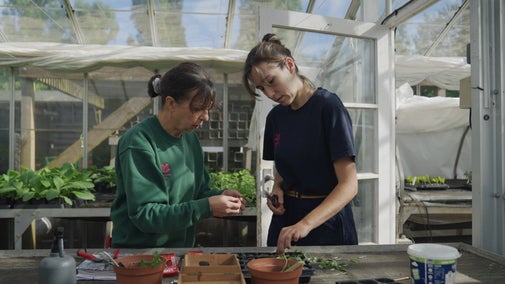
Discover what Sissinghurst Castle's garden team is up to each month with their popular Gardeners' Cuttings updates.

Learn about our flood-management project and how the work that we’re doing is helping to further increase biodiversity on our estate.

Discover the life of prolific writer and passionate gardener Vita Sackville-West and her husband Harold Nicolson at Sissinghurst Castle Garden.

Discover the LGBTQ+ heritage at Sissinghurst Castle Garden and how this history has shaped the world-famous garden that is enjoyed by many visitors today.

From castle to prison, working farm to world-renowned garden, Sissinghurst's past is nothing but varied and each of its incarnations have added to its story.

Explore the objects and works of art we care for at Sissinghurst Castle Garden on the National Trust Collections website.

Go behind the scenes and hear from the experts and conservators who look after many treasured objects in this BBC programme, including Vita's Writing Room and a Terracotta pot at Sissinghurst Castle Garden which feature in episode 2 of season one. Catch up on the series so far on BBC iPlayer here.

Whether you’d like to make a difference, take up a new hobby or share your skills and experience with us, we're always on the lookout for new members to join our volunteering team.

Learn more about our local Supporter Groups who help with important conservation work at Sissinghurst Castle Garden, and at other properties across the UK. Donations from these Groups have gone towards conserving historic items such as the pictured storage jar, known as a butter jar, in the White Garden at Sissinghurst.


Join today and help protect nature, beauty and history – for everyone, for ever. Enjoy access to more than 500 places with National Trust membership.
By sharing your email address you’re agreeing to receive marketing emails from the National Trust and confirm you’re 18 years old or over. Please see our for more information on how we look after your personal data.